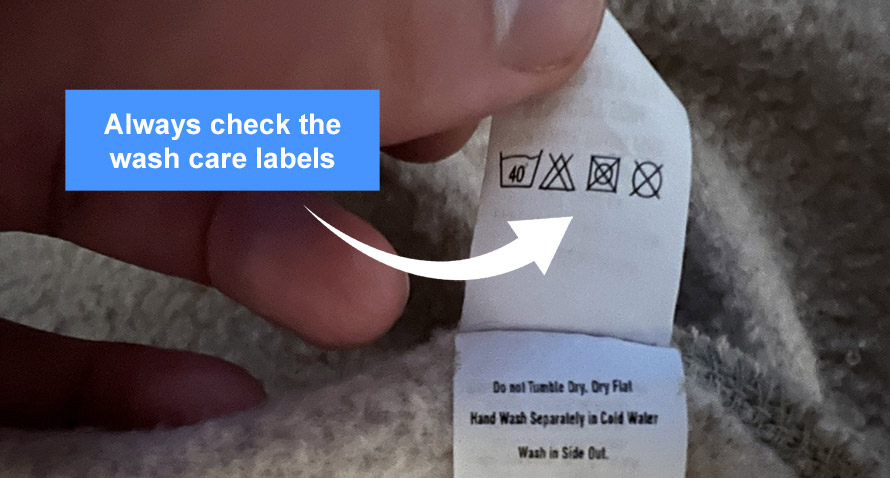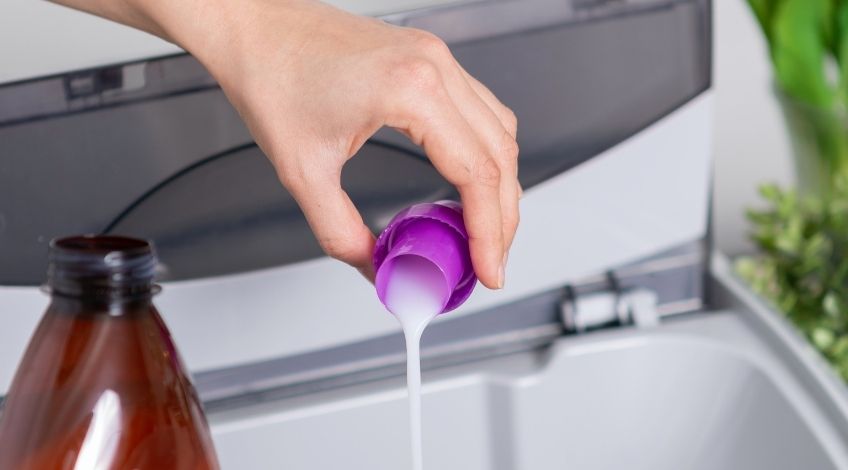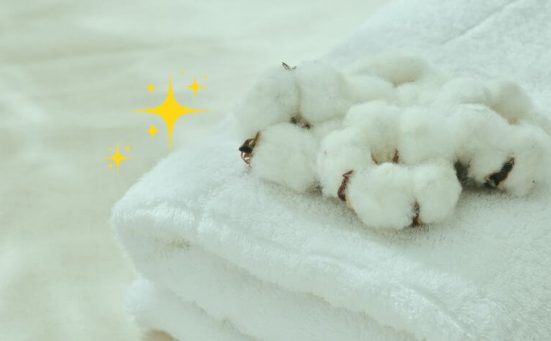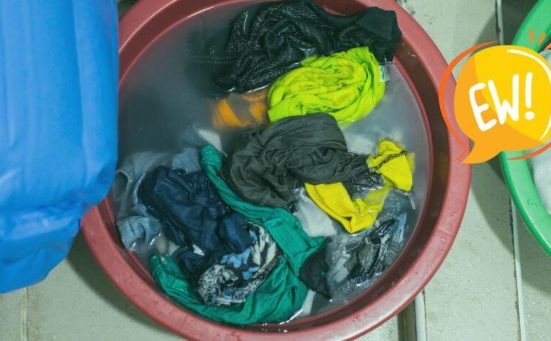![Why Is My Washing Machine Putting Holes In My Clothes [answered]](https://checkappliance.co.uk/wp-content/uploads/2023/06/Why-Is-My-Washing-Machine-Putting-Holes-In-My-Clothes-answered.jpg)
Why Is My Washing Machine Putting Holes In My Clothes? [answered]
There are several reasons for holes appearing in clothes after they have been washed. And although we often assume it’s the washing machine at fault, it rarely ever is.
In most cases the fault lies elsewhere and in this article we’ll look at the most common causes of washing coming out of the washing machine with holes.
What Are The Most Common Causes Of Holes In Clothes After Washing?
There are many reasons why washing could leave the machine with holes in. These include;
Overloading Your Machine
Not only does overloading the drum of your washing machine mean that the clothes won’t get washed properly. It also means there’s a much higher chance of some of the clothes getting holes.
The problem is that if the drum is overloaded some of the clothes will be forced between the door seal and the drum. Once they become trapped they will be put under excessive pressure as the drum rotates.
This will lead to holes ranging in size from small, almost unnoticeable to large rips or tears.
Another reason for holes appearing in clothes when overloading the drum is that as you cram all of the clothes inside, they get caught up and tear. The fabric can become slightly damaged and weakened during the cramming in.
This is then exacerbated once the drum begins turning. The result is clothes with holes.
Using The Wrong Spin Cycle
One of the most common reasons for holes appearing in clothes after washing is using too fast a spin speed. Different fabrics should be spin dried at different speeds. For instance;
- Silks should be spun at 400 rpm (revolutions per minute)
- Delicates should be spun at 600 rpm
- Denim should be spun at 900 rpm
- Woollens should be spun at 1200 rpm
- Cottons should be spun at 1400 rpm
Which means spinning silks with cottons at 1400 rpm would potentially cause damage to the silk garments.
Ignoring The Care Label
Pretty much every garment you own will have a care label. This label gives you all of the information you need to care for the garment. The problem is most of us don’t bother to read the care label.
Which means we stick to one or two programs on our washing machine regardless of what we’re washing.
Many modern clothes are made from materials that are easily damaged. Especially if they’re washed using an incorrect cycle. Some wash cycles are too intense for certain fabrics plus the spin cycle can be too long as well.
This all leads to the fabric becoming damaged which causes holes to appear in the material. You are literally beating your clothes to death by using the wrong program on your machine.

Using Too Much Bleach On Your Clothes
Using too much bleach will cause damage to the fabric. Bleach will actually burn the fabric away and cause holes.
If you need to bleach your whites, always ensure it is diluted first.
If possible try using a less harsh product you could try using white vinegar in place of bleach as this works just as well but is less harmful to the fabric.
Using The Wrong Detergent
You might think that using the wrong detergent couldn’t lead to holes forming in your clothes, but you’d be wrong. Using cheap, low quality detergents can over time cause damage to the fibres of your clothes.
Which in turn, can cause holes to appear in those clothes. Even decent detergents used on the wrong materials can cause damage to the fabric.
For instance wool and silk materials cannot be washed using regular detergents. The same is true for mixed fibres if any of those fibres happen to be made from wool or silk.
If you were to also wash using an incorrect program, your clothes are twice as likely to become damaged during the wash.
Leaving Zips & Clasps Undone
This is one of the most common reasons for holes appearing in clothes after washing. The zip or clasp can catch on any stray fibre that it comes into contact with.
This all leads to wear and tear on the fabrics which leads to holes appearing.
Always ensure all zips, clasps, catches, studs, buttons etc are done up before the garments are added to the washing machine.
Letting Metal Objects Into The Drum
We’ve all done it, left a key in our pocket or maybe a screw or nail from some DIY we were doing. These metal objects get into the washing machine and cause havoc with our clothes.
They either catch on the clothes and cause holes or worse still, damage the drum of the machine. If anything does damage the drum of the machine, then everything that goes into that drum from that point onwards is at risk.
Always check the pockets or trouser turn-ups for any foreign bodies especially (but not exclusively) metal objects.
Bra Wires
Sometimes, bra underwires can get caught between the drum and the side of the machine. You might not notice this when you’re loading the machine, but during the drum’s rotation the bra wire can catch on clothes and cause them to rip.
Damage To The Drum
If any metal objects get caught on the drum or the drum paddles, it can cause damage which then catches on the clothes in the drum.
To check for drum damage, wrap a pair of old tights around your hand and spin the drum whilst placing the tights inside the drum.
Move the tights around to check all parts of the drum for any snags or catches.
Buying Cheap Clothes
There are so many offers available nowadays for cheap clothes. In store and online there are hundreds or even thousands of cheap clothes on offer.
In some cases, cheap clothes means cheaply made clothes from poor quality materials and shoddy workmanship. Not always, but it does happen.
The point we’re making here is that you can’t buy a cheap garment and expect it to last forever. At some point the material will break down which could cause a hole to appear.
Mixing Materials That Don’t Mix
This is very common and we’ve all done it, mixing clothes of different materials in the same wash. We rarely use all of the programs on our washing machines.
In fact, most people only ever use two or three programs on their washing machine. This means delicates often get washed with workwear which is a recipe for disaster.
If you do have to wash delicate items in a general wash use mesh laundry bags to protect them.
- 【PROTECTS DELICATES】Eono laundry wash bags, durable and breathable, made of heavy duty yet lightweight polyester mesh, with solid workmanship, are specially designed to protect your delicates in the washing machine, keep them safe from damage and extend the life of delicates.
Leaving Wet Clothes In The Drum
If you are in the habit of leaving clothes in the drum after the machine has finished, you create the perfect environment for many insects. Silverfish for example live in damp dark places and have been known to chew through fabrics.
Always remove your clothes from the washing machine as soon as the cycle has finished.
Moths In The Wardrobe
It could be that the holes are not appearing in the washing machine. It could be that there is an infestation of moths in your wardrobe.
The moths themselves are not the problem – it’s their babies that eat fibres. You should use a moth killer sachet or hanger in your wardrobe to get rid of unwanted moths.
No products found.
Body Sprays Or Deodorants
Many people spray their clothing with body spray or deodorants. Some of these sprays contain harmful chemicals which could damage the fabric and cause the weakened fabric to tear whilst in the washing machine.

Ways To Help Prevent Holes In Clothes Whilst Washing
There are a few things you can do to help prevent getting holes in your clothes when washing them in a machine.
You could;
Use A Fabric Conditioner
Fabric conditioners actually lubricate the material during the washing process to actively prevent wear and tear to the fibres. They reduce the amount of friction caused as clothes rub together in the drum as it rotates.
Or Use A Fabric Conditioner Alternative
If you don’t have any fabric conditioner or you would like to use a natural alternative, add 118 ml (½ cup) of white vinegar to your wash.
The smell will wash away during the rinse cycle. But always use white vinegar as brown vinegar can stain some fabrics.
Dry Your Clothes Naturally
Instead of subjecting your clothes to even more stress in the tumble dryer, dry your clothes on a washing line in indirect sunshine.
Alternatively, you could use an airer which can be used indoors or outside.
SEE ALSO: Best Clothes Drying Racks & Airers (Clothes Horses Reviewed)
Speed Up Indoor Drying Using A Dehumidifier
If you decide to dry your clothes indoors, using a dehumidifier is a great way to speed up the drying time. They work by removing moisture from the air which allows the drying washing to release more moisture into the air.
This makes the drying time far quicker than just relying on the airflow in the room to dry the clothes.
SEE ALSO: Best Dehumidifier For Drying Clothes Inside (perfect size for laundry)
Frequently Asked Questions
There are several reasons why your clothes could be getting holes in the washing machine. They include; spinning at the wrong speed, using the wrong program, overloading the machine, using the wrong detergent and washing mixed materials together.
Your clothes could be getting little holes due to moth infestation. You should place a moth killer sachet in your wardrobe. Other reasons include overloading your washing machine, using too much bleach, using the wrong detergent or using the wrong spin speed.
The number one cause of washing machines ripping clothes is overloading the machine. To prevent the machine from tearing your clothes, don’t overload it. You should also check for any sharp protrusions in the drum of the machine. If you find any, don’t use the machine until these have been dealt with.
Fabric conditioner does help to prevent holes from forming in clothes during the washing process. This is because fabric conditioner lubricates the fibres of the laundry and helps to prevent friction damage.
Many body sprays and deodorants contain chemicals that could damage the fibres of some materials.
Also, follow us on Pinterest ...




